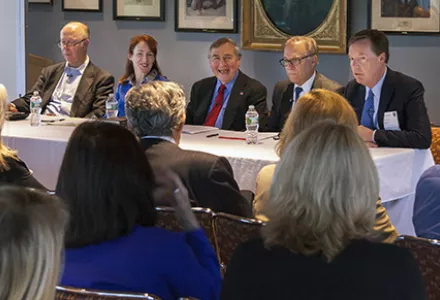May 16, 2014
Takeaways from the Harvard Kennedy School IDEASpHERE presentation “Follies and Fiascoes: Why Does U.S. Foreign Policy Keep Failing?,” with Stephen Walt
Summary
If the United States had a “perfect system” for conducting foreign policy, we would still have challenges, said Stephen M. Walt, Robert and Renee Belfer Professor of International Affairs, during a Harvard Kennedy School “IDEASpHERE” session titled “Follies and Fiascoes: Why Does U.S. Foreign Policy Keep Failing?”
But, he added, our system “falls short” of perfection and has become worse in recent years.
Arguing that U.S. foreign policy has gone downhill since the Cold War, Walt’s examples included: the deteriorating relationship with Russia; the Iraq invasion; increase in nuclear weapons in North Korea, India, and Pakistan; and a lower level of freedom throughout the world.
One of the reasons for the “dysfunctional” foreign policy system, Walt argued, is the influence of the very large and powerful foreign policy “community” that includes government, think tanks, interest groups, lobbies, academia, and media. Having a positive reputation within this community means “staying within a certain realm regarding foreign policy.” Because this community is more supportive of global advocacy than the American people at large, it has to bring around the public to its views, and that includes exaggerating dangers. The reason the community has to “exaggerate” those dangers is because the U.S. is so secure, Walt believes.
Ironically, Walt added, “We’re in such good shape overall that it might not matter” that our foreign policy fails so often. It’s important, though, not to make “too many mistakes.”

